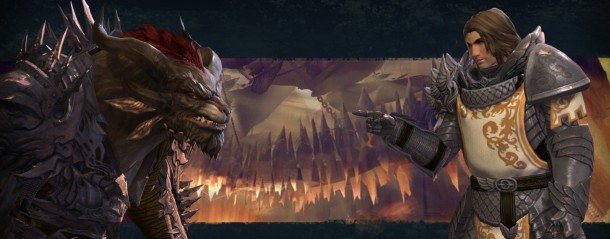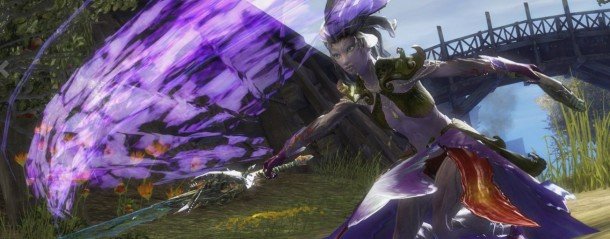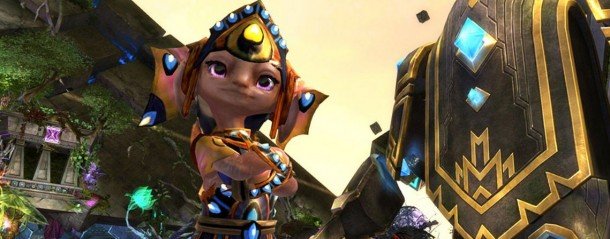Guild Wars 2 writer on MMO storytelling and "sneakily getting the player to tell us what kind of game they want"

Telling a coherent story in an MMO is no easy thing. It's difficult enough in a singleplayer game, where writers and designers only have to deal with a single perspective, a single set of player motivations. Telling a story to thousands of online players is like trying to deliver a speech to a crowd at a funfair: you'll get some people to listen, but you'll lose just as many if not more to the merry-go-rounds, the shooting galleries, the things they're really there for.
I spoke to ArenaNet lore and continuity designer Ree Soesbee about how the Guild Wars 2 writing team has chosen to approach that challenge, as well as the difficulty imposed by having a fully-voiced player character and the importance of providing light-hearted moments amongside drama and tragedy.
How do you balance telling your own story against what people are going to inevitably run off and do?
There's a certain amount of iteration. We start with a limited number of people in the room and as we build structures for things they get passed on and the next team adds detail and it comes back to us periodically. We do that because we want the story to be as consistent as possible.
There's a story chain in the world where you go to a Hylek village that is being threatened. The Hylek are frogmen who worship the sun god. As a player you get involved in their village, you learn their lore, you help them make decisions - do they support this priest, or do that thing - and then when you go into an event map that has Hylek all over it we want that to be the same feeling. So we have to bounce back between them all and make sure there's a consistency involved in the whole game. We do the best we can.
So it's more about the experience as a whole than a single narrative?
The narratives are different. The way I tend to write a story in a game - same way that I tend to gamemaster for an RPG - is I build a world and I make it as detailed as I can and then I just turn the players loose. I know within the story that these points are going to happen - this place will be attacked, that good guy will die, you'll eventually have to fight that bad guy - but I don't know how the players are going to get there. There are eight different ways they could get there.
The biggest gaming news, reviews and hardware deals
Keep up to date with the most important stories and the best deals, as picked by the PC Gamer team.
In Guild Wars 2 you could be an Asura, you could have an invention and it could go wrong and you could realise that it went wrong because that bad guy did it. You could come from the Sylvari and be in the forest and find several murdered Sylvari. When did that happen? Oh, that bad guy did it. When you and the Asura decide to go into the dungeon, you'll find that you're both fighting the same bad guy but from very different motivations. That allows us to tell a singular story about the dragons that are trying to take over the world, but depending on your motivations the story might be different, the NPCs coming with you might be different. The things you're able to bring in, whether its a magic item from the Priory or siege items from the Vigil can be very different while we're still telling a singular type of story.

You've got voiced player characters, and the player is hands-off at the point when they're watching the character they've made talk.
Little bit.
What's the challenge of writing that? Presumably you've got a pretty narrow line to walk.
Yeah. We've done a lot in [text-based] conversations to allow you to choose if you want to be very ferocious, very kind, if you want to be kind of a sneak thief. In the cutscenes its a little more limited because you can't have a guy say too many different words. We do make alternate lines and even entire alternate cinematics, where if the player is a Sylvari or has a specific reason to hate this guy they might get a more aggressive player line or a whole different response from the guy. We try to install those as much as we can, because we really want our choices to make a difference. Not just the tangible difference of “I'm fighting with siege weapons” versus “I'm fighting with a magic item” but also “my character's a different guy because he's a Sylvari, my character's a different guy because it's a Charr.” We really try to take that into account. There's only so much we can do - we can only have the actors in the studio for so long or they get fussy.
We really try to keep in mind that the player character is a hero, that whatever choices he's making are what the player character considers to be for the good of the world or the good of his people.
You guys take a pretty definite line - they're a hero, they're going to have this particular moral alignment. It's “how are you going to achieve this heroic thing” rather than “are you an asshole”. Is that degree of extra freedom superfluous in other games?
No - it depends on the kind of game you're playing. We've said from the beginning that Guild Wars 2 is a game about heroes. If you're playing a game about villains there should totally be choices to be a villain. What we wanted to do was tell a story that ends hopefully in the defeat of the dragons, and the choices of bad guy who would do that fall into anti-hero. So that was as far as we were willing to go.
We let our world be the sandbox. You can go into the world and choose not to help the villagers and let the centaurs just destroy the village. You can do a lot more of that in the external world. We give you 50% diversity in the story. If you want want 100%, the other fifty is going to be out in the world because we have to keep to a story and a direction.

In terms of the way people behave, in Guild Wars 2 there's no codified way of saying “I let this mugging happen - plus two asshole points.” Do you find that you just don't need to do that?
We get a little of that because some of the conversations have choices where you can choose to be ferocious and you literally get asshole points and the next guy might be scared of you. But I would rather have a game that says “we're going to give you 50% of the options that you would have in real life, and we're going to make those 50% of the options make a difference” than have a game that says “I'm going to give you 100% options, but it's really not going to matter that much because the story has to be this way.” I feel like we have said up front that this is the line, instead of pretending that there's a larger line that we didn't live up to.
Is it the case then that the more people you hold people to that 50%, the more they can express themselves?
The more we can remind them of what they picked. We let human player characters pick their social class and we're trying to put in options where they'll treat you differently or you'll get a different result depending on what your social class is. You said “I like a guy that's a member of the gentry” and so we're treating you like a member of the gentry. So you like your guy, because you picked it: that's your investment in that character.
Surely responses are better the more subtle they are, the more seamless they are?
The more seamless they are. Seamless isn't always subtle, but yeah. The more they make sense, the more the reactions and responses can be tracked in your mind as “yeah, that's my character."
Next: the themes of Guild Wars 2, the importance of comedy, and when it's okay to build the world's most depressing MMO.
Joining in 2011, Chris made his start with PC Gamer turning beautiful trees into magazines, first as a writer and later as deputy editor. Once PCG's reluctant MMO champion , his discovery of Dota 2 in 2012 led him to much darker, stranger places. In 2015, Chris became the editor of PC Gamer Pro, overseeing our online coverage of competitive gaming and esports. He left in 2017, and can be now found making games and recording the Crate & Crowbar podcast.


